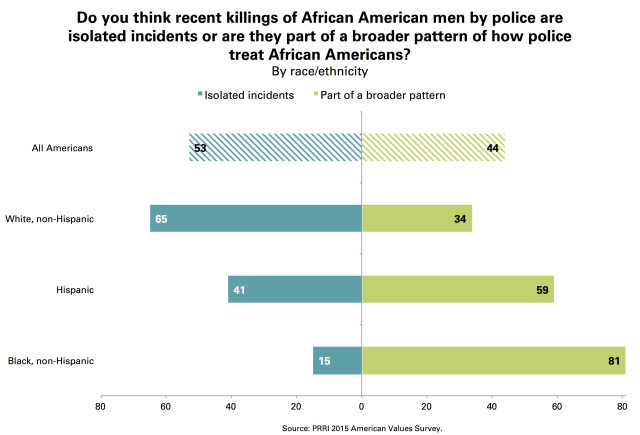Updated 08/07/2016.
This week marks the two-year anniversary the police killing of black teenager Michael Brown in Ferguson, Missouri, and the subsequent protests that have erupted as a result. It’s also a reminder of the ongoing racial issues plaguing the country: the police killings of black men have dotted the country’s headlines and inspired protests nationwide in the last two years—and PRRI has been charting the contrasting attitudes white and black Americans’ have on the fairness in the criminal justice system, police mistreatment, and more.
A chasm separates black and white Americans’ attitudes toward the police. Blacks are nearly four times as likely as whites to say that police mistreatment is a major problem in their community: 64 percent vs. 17 percent, respectively. Similarly, less than half (48 percent) of blacks have a great deal or some confidence in the police, compared to 83 percent of whites who report being confident in the law enforcement.
Whites and blacks also view the recent police killings of African American men very differently. About two-thirds (65 percent) of whites say recent killings of African American men by police are isolated incidents, while only 15 percent of black Americans say the same. More than eight in ten (81 percent) black Americans say recent police killings of African American men are part of a broader pattern of how police treat African Americans.
Americans overall are divided on police officers’ racial blindness, with four in ten (41 percent) saying police officers generally treat blacks and other minorities the same as whites. The racial divide on this issue is deep: while more than eight in ten (84 percent) black Americans say police officers do not generally treat non-whites the same as whites, white Americans are more divided, with 50 percent saying police officers are fair to all races and 48 percent disagreeing.
Unsurprisingly, there are sharp racial divides on the issue of “reverse discrimination.” Roughly half (49 percent) of Americans say discrimination against whites has become as big a problem today as discrimination against blacks and other minorities, a view shared by a majority (57 percent) of white Americans and less than three in ten (29 percent) black Americans.





